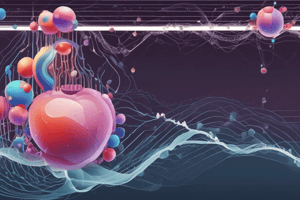Podcast
Questions and Answers
What is the primary function of lipoproteins in the blood plasma?
What is the primary function of lipoproteins in the blood plasma?
- To transport insoluble forms of lipids (correct)
- To break down lipids into smaller molecules
- To store lipids in the liver
- To synthesize lipids
What type of lipids are carried by chylomicron?
What type of lipids are carried by chylomicron?
- Triacylglycerol (TAG) (correct)
- Bile acids
- Cholesterol
- Phospholipids
What is the role of lipoproteins in energy metabolism?
What is the role of lipoproteins in energy metabolism?
- To synthesize ATP from lipids
- To break down proteins into amino acids
- To provide substrates for energy metabolism (correct)
- To store energy in the form of glycogen
What is the precursor for hormones synthesized from lipoproteins?
What is the precursor for hormones synthesized from lipoproteins?
What type of lipoprotein carries cholesterol to all body cells?
What type of lipoprotein carries cholesterol to all body cells?
What is the role of lipoproteins in the transport of lipid-soluble vitamins?
What is the role of lipoproteins in the transport of lipid-soluble vitamins?
What is the primary function of triglycerides in the body?
What is the primary function of triglycerides in the body?
What is the characteristic of hydrophobic lipids?
What is the characteristic of hydrophobic lipids?
What is the source of endogenous lipids?
What is the source of endogenous lipids?
What is the essential component of all animal cell membranes?
What is the essential component of all animal cell membranes?
Why are lipids associated with apolipoproteins to form lipoproteins?
Why are lipids associated with apolipoproteins to form lipoproteins?
What is the characteristic of amphipathic lipids?
What is the characteristic of amphipathic lipids?
What is the function of lipids in the body?
What is the function of lipids in the body?
What is the composition of lipoproteins?
What is the composition of lipoproteins?
Flashcards are hidden until you start studying
Study Notes
Introduction to Lipids
- Lipids are organic compounds containing hydrogen, carbon, and sometimes oxygen, forming the framework for living cell structure and function.
- Sources of lipids: exogenous (absorbed from diet) and endogenous (synthesized by hepatic cells and adipose tissue).
Types of Lipids
- Hydrophobic lipids (non-polar): triacylglycerol and cholesterol esters.
- Amphipathic lipids: phospholipids, fatty acids, and cholesterol.
- Lipids must be transported between tissues and organs through the blood, but are insoluble in water, requiring association with apolipoproteins to form water-miscible lipoproteins.
Lipoproteins
- Lipoproteins are multicomponent complexes of proteins and lipids, each with a characteristic molecular mass, size, composition, density, and physiological role.
- Lipoproteins transport insoluble lipids in blood plasma, delivering lipid forms (cholesterol and TAG) from one organ to another for utilization.
- Components of lipoproteins:
- Phospholipids, cholesterol, and proteins outside/ exterior.
- Cholesteryl esters and TAG inside/ interior.
Functions of Lipoproteins
- Lipoproteins serve as transport vehicles for exogenous and endogenous lipids.
- They provide substrates for energy metabolism (TAG), essential components for cell structure (PL, cholesterol), and precursors for hormones, bile acids, and bile salts (cholesterol).
- Lipoproteins carry lipid-soluble vitamins (KEDA).
Types of Lipoproteins
- Four major types of lipoproteins:
- Chylomicron (CM): carries TG from intestine to liver.
- Very low density lipoproteins (VLDL): carries TG from liver to other body cells.
- Low density lipoproteins (LDL): carries cholesterol to all body cells.
Studying That Suits You
Use AI to generate personalized quizzes and flashcards to suit your learning preferences.




